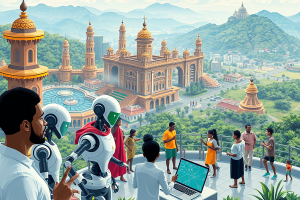BY ABEBE WOLDEGIORGIS
Much has been said about the Ethiopian agriculture, characterized by subsistence-based traditional way of farming and less input utilization with less output.
Since the dawn of the 20th century, in a bid to modernize the sector, various measures has been taken by the successive governments and some progress has been registered. However, the sector is vulnerable to drought, herbs and diseases which again hamper the growth of production.
On the other hand, due to the rapid population growth, still the nation is unable to meet its food demands. Therefore, utilizing cutting- edge technology to upgrade the status of the sector has been taken as a way out.
Among others, utilizing bio-technology is proved to be effective and viable. However, all agree that, the technology should not compromise bio safety.
Desalegn Atnafu is Deputy Director in the Directorate of Biosafety and Exogenous Invading Species Supervision under the auspicious of the Ethiopian Environmental Protection Authority.
As to him, his directorate is working on two main objectives and one is preserving the bio-safety system which is protecting the environment from an unlawfully-utilized genetically-engineered seeds and controlling invading exogenous specious and minimizing their negative impact on the environment.
He further said that, exogenous plants may reach here by various means and among others, by tourists, with imported commodities and with big agricultural machineries. In addition, some exogenous plants which might be regarded as important might be imported here legally but after times might change their behavior and bring negative consequences. On the other hand, there is a chance that some exogenous plant seeds might be transported here by birds.
As to him, his directorate set various mechanisms to control the entrance of exogenous seeds here. In collaboration with other stakeholders and bureaus in the regions, inspection work is underway and maximum efforts are being exerted to reduce the negative impact of the invading species on human and animal health as well as environment, economy and biodiversity.
As mentioned above, agriculture is the main stay of the nation’s economy. Yet still utilizing backward technology is common and outdated farming system still prevails.
To upturn the situation, agricultural research centers engaged both in the conventional and none conventional research including on the utilization of transgenic crop. Asked the role of his directorate in the following up of the researches and the experimentation in this regard, Desalegn said that, agricultural activities must be supported by the modern science and technology and his directorate is working in collaboration with stakeholders. For instance, cooperation with the Ethiopian Agricultural Research Institute, with the Ethiopian Biotechnology Institute and with universities working on biotechnology is underway for long.
Every research and experiment in relation to transgenic plants, conducted by the two institutes beforehand, must get license from the Ethiopian Environmental Protection Authority and the research and experiment should go in line with the Cartagena Protocol and Proclamations enacted by the Ethiopian Parliament.
The research and the field trial works are inspected and whether they harm human and animal health, affect the environment and the socioeconomic life of the society or not is checked.
In addition, the Directorate works on awareness creation on the stakeholders with regard to bio-safety.
He also said that, as Ethiopia is signatory to the Cartagena Protocol his Directorate is dedicated to the implementation of the protocol. To that end, it has played a pivotal role by providing ideas which can be utilized as inputs for the preparation of the proclamation with regard to biosafety in acted by the Ethiopian Parliament in 2015 GC.
The neighboring countries such as Sudan and Kenya have already legalized the utilization of GMO crops such as cotton and maize. Asked whether the directorate has the capacity to control the border crossing of the GMO crops or not, Desalegn said that, GMO crops are brought here by two ways by illegal means or otherwise.
The importing of GMO crops without the permission of the pertinent body is legally prohibited and if a person is found guilty of importing s/he will face criminal charges. And if his criminality is proved by court based on the nation’s law and international convention he will be fined and imprisoned.
Inspection and controlling work on illegal transportation of GMO crops has been made in collaboration with Customs Commission and institutions which work on quarantine and with other stakeholders.
Training is provided to staffers who work in Customs Commission to strengthen their inspection skills. But there is high turnover of human resource. To fill the gap training has been given frequently.
As to Desalegn, till now, no damage on the environment or human and animal health is induced by GMO crop in the country. So far no report is made in this regard. It would have been reported.
Currently, Ethiopia aspires to boost the textile production so that, enhancing export earnings from hard currency can be expanded. However, local cotton production volume is very small. There are factors which contribute for the dwindling of cotton yields. Due to the weak capacity of the local cotton species in withstanding pests, the output is significantly reduced.
As a result, the nation is forced to import cotton from abroad and spend its meager hard currency for cotton importation.
To reduce import and to raise cotton production, researches, experiments and production of GMO cotton locally has been taken as a solution. Reflecting his view on this matter Desalegn said that, to enhance cotton production and to meet the demand various measures have been taken and in this regard there is interest to support the sector through applying biotechnology because it helps to resist pests, and raise productivity. This enables the country to meet the local cotton demand.
Before they start research and experiment in GMO cotton, Agricultural Researcher Institutions, must acquire license from the Ethiopian Environmental Protection Authority. The authority also inspects the research and field trial of GMO crop. When the research output is proved effective with no side effects on the environment, a green light is given to the institute to distribute the seed to the stakeholders.
As to Desaleign, the field trial on the GMO cotton is conducted and has proved its effectiveness. Recently, a workshop had taken place with farmers engaged in cotton production. Participants gave their testimony that the GMO cotton is better than the local cotton species in terms of raising productivity.
However, due to shortage of currency, it is unable to import GMO cotton seed.
The importation of the transgenic cotton seed, is based on the ownership rights of the originally producer country. The importing country must pay the royalty fee to the owner country.
He further said that, countries in Europe, Asia and Latin America have long been utilizing GMO crops that enabled them to transform their agriculture production and boost their agricultural export. In Africa as well GMO crop is being used extensively and currently about 192 countries are signatories to the Cartagena Protocol and whenever they conduct research and experiment on GMO crops, they must abide by local and international laws. The GMO seed has its own reproduction lifespan and when it is terminated, the importation of the seed is obligatory.
Had it been produced by our own scientists, a stop to importation would have been made.
But by now the BT cotton is imported from India. All countries are required abide by the international law which recognizes a country’s patent right.
The Ethiopian herald May 5/2023




